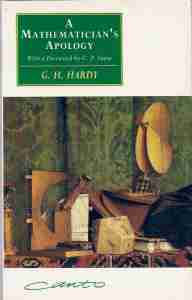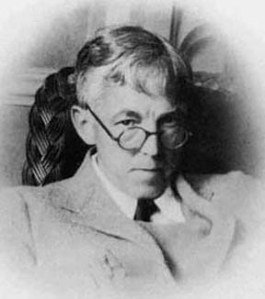I just finished G.H. Hardy’s ‘A Mathematician’s Apology,’ and I intend to jot down some thoughts on it. I’ve been wanting to read this book for quite a while (I’ve had it for over a year) as it has been mentioned in several other books and texts that I’ve read earlier. From what I’d read about it beforehand, I expected some sort of philosophical discussion and understanding of mathematics. I also expected a mathematician’s position in relation to some fundamental philosophical questions like religiousness. Hardy do discuss mathematics in what you may call philosophical way. I was, however, disappointed.

Hardy was a successful mathematician, working as a professor at both Cambridge and Oxford from circa 1900 until his death in 1947. One of his greatest achievements was to prove that the Riemann zeta function has infinitly many roots with real part equal to one half. According to himself, however, was his most important contribution (whether to mathematics or in general I’m not sure, but he probably meant both) the discovery of the Indian mathematical genius Ramanujan.
Hardy was a peculiar man. He had an intense interest in cricket, for example. Within a week of his death, he allegedly said to his sister: ‘If I knew that I was going to die today, I think I should still want to hear the cricket scores.’ Among other peculiarities was his games with God, which become even more peculiar since he claimed not to believe in God. One a trip abroad, he once sent a postcard to a colleague claiming that he had proven the Riemann hypothesis. The idea was that God would not let Hardy’s boat on the return journey sink and, according to some accounts, allow him the same, mytic fame Fermat achieved with his last theorem. Other accounts claims that the idea was that God would not let such a discovery as the solution to the Riemann hypothesis die with him.
I cannot help but to include this list of New Year’s resolutions Hardy once sent to a friend. It shows both ambition and humour. I am sure Hardy meant every word:
1. To prove the Riemann hypothesis,
2. To make a brilliant play in a crucial cricket match,
3. To prove the nonexistence of God,
4. To be the first man atop Mount Everest,
5. To be proclaimed the first president of the U.S.S.R., Great Britain, and Germany, and
6. To murder Mussolini.
Now, the book. First of all, I didn’t like the foreword by C.P. Snow. The foreword was not part of the original book, but was added long after Hardy’s death. It is much too long, particularly for a short book like the Apology, and it draws an untimely picture of Hardy in particular, and of early 20th century British academics in general, as shy, helpless brainies unable to deal with the real world. The only interesting parts in the foreword are the biographical facts about Hardy’s life.
The Apology was published in 1940. By then, Hardy had become a bitter, old man, deprived of his powers as an imaginative mathematician. Obviously, mathematics was one of two truly important things to him, the second being cricket. Feeling that his life is essentially over, he finds it necessary to write the Apology. The book seem to serve as some sort of justification of his life as a mathematician, and, as he claims some sort of generality of his arguments, justification of all mathematicians and of mathematics itself.
I found the topic of the book interesting enough; a discussion of why mathematics is worthwhile; mathematics, the only enterprise of man where absolute truths exist. I found Hardy’s conclusion a bit discouraging, however; I’ve been a student of mathematics myself, and have caugth a glimpse of true, mathematical beauty. I’ve been a fool, it seems, to think there’s something more to it. That depends, however, on my acceptance of Hardy’s position in relation to a range of issues. In most cases, I don’t.
First of all, I don’t like his tendency to claim his position to be common to all pure mathematicians. He may be right, but I won’t accept that just like that. The Apology is generally acclaimed as one of the best insights into the mind of a working mathematician available to laymen, and that may be an indication that Hardy is indeed talking for most mathematicians. Anyway, in his very first paragraph (§1), he claims that exposition and criticism is work for second-rate minds. I wholeheartedly disagree, and I am actually a bit offended by that. Hardy’s problem is his limited understanding of exposition and criticism which is revealed in the Apology. (I won’t argue this case, but I believe any experienced writer would agree that the exposition of the Apology has room for considerably improvement). How can he claim a mind to be second-rate when he does not understand what it does or how it works?
 However, the following passage from §2 I agree with and will try to carry with me in my pursuit of a doctoral degree:
However, the following passage from §2 I agree with and will try to carry with me in my pursuit of a doctoral degree:
Good work is not done by ‘humble’ men. It is one of the first duties of a professor […] to exaggerate a little both the importance of his subject and his own importance in it. […] He must shut his eyes a little and think a little more of his subject and himsleft than they deserve.
In the following paragraph (§3), Hardy essentially brings forth the one reason he finds sufficient to justify his life’s work as a mathematician; he’s good at it. Moreover, anyone who is really good at something should ‘make almost any sacrifice in order to cultivate’ his talent. Hardy also claims that very few men are able to do something rather well. I can accept Hardy’s personal justification to pursue his talent. I cannot, however, accept it as a general thesis; many talents aren’t desirable, neither personally nor socially. And, while it is tempting to think that few people have extraordinary talents (it seems plausible, for example, from a probabilistic position), all have the urge to survive embedded in their genes. Given the extreme complexity of the human brain, who knows what other talents lies hidden? Maybe it is more about discovering a talent than having it.
Towards the end of §6, Hardy again demonstrates his condemnation of rhetoric; he seem to think that content, or substance, doesn’t depend on form. That is simply not true. It may be that mathematicians in particular, and natural scientists in general, believe that they deal with substance only. However, substance and form are two sides of the same coin, and substance is what is read into a certain form. If there’s a problem with the form, or rhetoric, there’s a problem with the substance.
In §22, Hardy writes that he believes mathematical reality to lie outside us, and our (that is, mathematicians, I presume) function is to observe it. I’ve already written that mathematicis is the only scientific enterprise that deals with absolute truths; truths outside ourselves. (Think prime numbers.) Any mathematical discovery, however, depend on axioms, and axioms depend on us (mathematicians, that is). Axioms are supposed to be ‘natural,’ but as long as mathematicians seem to differ in opinion on the ‘intuitivity’ of axioms, I am skeptic. An example of such disagreement may be the Parallel Postulate, which has been subject to centuries of debate.
In §24, Hardy argues that mathematical reality lies outside us:
A chair or a star is not in the least like what it seem to be; the more we think of it, the fuzzier its outlines become in the haze of sensation which surrounds it; but ‘2’or ‘317’ has nothing to do with sensation, and its properties stand out the more clearly the more closely we scrutinize it. […] Pure mathematics […] seems to me a rock on which all idealism founders: 317 is a prime, not because we think so, or because our minds are shaped in one way rather than another, but because it is so, because mathematical reality is built that way.
I have sympathy with the prime number argument; I cannot imagine prime numbers being anything else than prime numbers. So, with my limited knowledge of mathematics, I may agree that some of what Hardy calls mathematical reality, like prime numbers, lies outside us. I still have problems with the axioms, though, but in the interest of time I’ll leave that discussion for now.
My ‘review’ is far too long already. I need, however, to discuss one more claim Hardy makes to complete my discussion of the Apology. Hardy makes a clear distinction between ‘real’ mathematics and ‘trivial’ mathematics. With trivial, he means all type of applied and school mathematics. This may seem to be a clear distinction, and it is crucial to Hardy’s final conclusion. Hardy goes on to claim that real mathematics is not harmful in any way, as long as it is ‘useless.’ And with useless, he means not applicable to real world problems. There is no clear distinction, however, between real and applied mathematics, and while it may be difficult to realize the applied potential in pure mathematical discoveries, history has shown it otherwise. Numerous results from real mathematics has proved useful in applications. Crown examples are the role of prime numbers in cryptography and Einstein’s theory of relativity. And as long as there is no clear distinction between pure mathematics and applied mathematics, Hardy cannot escape the truth that mathematics as a whole is useful and, more severe to his conclusion, may be harmful.
To Hardy’s defence, it may be asserted that he lived in a different time than ours, and, if they ever were, that his views are probably no longer are representative of mathematicians in general. Indeed, I do hope that present day mathematicians are more in contact with reality than what Hardy seemed, and realize both the potential value and danger in pure mathematics.
Hardy’s conclusion, then, is that mathematics is nothing more but a creative art, and that his achievements
[…] differs in degree only, and not in kind, from that of the creations of the great mathematicians, or of any of the other artists, great or small, who have left some kind of memorial behind them.
It seems clear that Hardy, despite all his devotion and appreciation of it, reduces mathematics to an art, and resembles great mathematicians like Hilbert and Abel with other great artists like Mozart and Picasso . Not that I don’t think highly of art. Art, to me, is a product of the human mind; meant to please or provoke; meant to mean something; meant to influence someone; and, not the least, a product of an urge to create. Art is a sign of prosperity and abundance, not necessarily a necessity. Pure mathematics, however, is different; it is an expedition into the absolute; investigating and observing logic; not meant to please or provoke, but a necessity to progress. It may resemble art, nonetheless, depending on creativity and inspiration, but still being different, and, in my eyes, more important; while any artist or may be much more important to any one individual, the great mathematicians are much more important to the human kind.
Those interested can download the book for free (luckily, without the foreword by C.P. Snow) and make up their own mind.